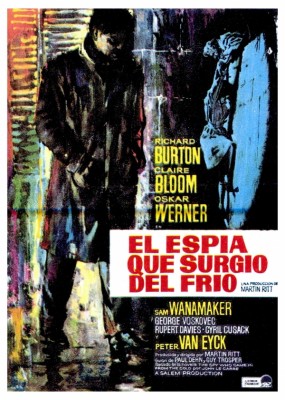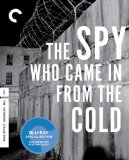| Reviews & Columns |
|
Reviews DVD TV on DVD Blu-ray 4K UHD International DVDs In Theaters Reviews by Studio Video Games Features Collector Series DVDs Easter Egg Database Interviews DVD Talk Radio Feature Articles Columns Anime Talk DVD Savant Horror DVDs The M.O.D. Squad Art House HD Talk Silent DVD
|
DVD Talk Forum |
|
|
| Resources |
|
DVD Price Search Customer Service #'s RCE Info Links |
|
Columns
|
|
|
Spy Who Came in From the Cold (Criterion Collection), The
Espionage thrillers don't get any better than The Spy Who Came in From the Cold (1965), Martin Ritt's film of John le Carré's 1963 novel. Contemporary critics were impressed by the movie's supposed realism and how it served as a sobering, adult counterpoint to the then-current craze for spy pictures, the Sean Connery James Bond movies leading the way. But comparisons to 007 are basically pointless, apples and oranges, and anyway in terms of tone the movie is a lot closer to The Ipcress File, released nine months earlier and which anticipates many of this film's qualities. The Spy Who Came in From the Cold over-emphatically moves in the opposite direction from Bond, deglamorizing the trade: it was among the last big studio films in black and white, and it was marketed almost as an art house film. "Brace Yourself for Greatness," immodestly said the ads.
Its real appeal lay elsewhere. The movie isn't just cynical; the Bond movies are frequently that. No, it openly condemns the hypocrisy of supposed British Democracy (and by extension the "Free World") where the ends always justify the means, no matter how ruthless or immoral. Ritt himself was a bitter victim of the Blacklist, and he chose to emphasize those parts of le Carré's novel.
The movie, adapted mainly by screenwriter Paul Dehn, who like le Carré was an ex-spook (le Carré even claiming Dehn had been "a professional assassin … and a lovely guy"), otherwise follows the book quite closely with one major exception. Stars Richard Burton and Claire Bloom are okay but the supporting cast is significantly better, particularly Oskar Werner and Cyril Cusack, whose characterizations are more in line with le Carré's novels and the later George Smiley television miniseries starring Alec Guinness.
Criterion's new Blu-ray, licensed from Paramount, is a knockout. Oswald Morris's black and white cinematography looks absolutely stunning here, and an unexpectedly stereophonic soundtrack adds immeasurable to the film's overall impact. The numerous supplements are also unusually good, headlined by a superb interview with le Carré that's both refreshingly frank and right on the money in assessing the film's strong and weak points.
The film opens with burnt-out defeatist West Berlin SIS Station Head Alec Leamas (Richard Burton) tense but poker-faced as he and others nervously await the defection of Karl Riemeck, a double-agent, but who is shot dead while trying to slip across the border from East Germany. (In many respects it bookends the climax of another le Carré story, Smiley's People.)
Leamas is recalled to London by Control (Cyril Cusack), chief of the "Circus." On the heels of this latest failure, Leamas is ripe for recruitment by the Abteilung, the East German Secret Service, and Control orders his agent to stage his own defection. The Circus wants Leamas to provide false information that will implicate Control's East German counterpart, ex-Nazi Mundt (Peter van Eyck), as a British double agent, something Mundt's second-in-command, German Jew Fielder (Oskar Werner), already suspects.
To make the defection believable, Leamas spends several months posing as a disgraced alcoholic reduced to working as a file clerk at a small private library. There he meets and falls in love with 20-something Nan Perry (Claire Bloom), an idealistic anti-nuclear activist and member of the Communist Party of Britain.
The film's best scenes show East German agents cautiously nibbling at Control's bait, methodically passing Leamas up the chain of command from first contact Ashe (Michael Horden), a homosexual (still technically illegal in Britain at the time), through Holland agent Peters (American Sam Wanamaker, also a real-life victim of the Blacklist), and eventually to Fiedler. Initially doubtful about Leamas's authenticity, the like-minded Fiedler eventually comes to regard Leamas as a kindred spirit, and buys his story. But then Mundt suddenly appears, arrests Fiedler and exposes Leamas as a double agent.
Director Ritt and star Burton did not get along, and le Carré was brought in to act as a buffer between the quarrelling talents. Further complicating matters was Burton's recent marriage to Elizabeth Taylor, who along with her entourage was an additional distraction, she possibly concerned about Burton's relationship with ex-lover Bloom.
(I also wonder if a strange continuity issue resulted from the Ritt-Burton friction. In high-def especially what appears to be a skin tag is visible just below Burton's right eye. Its size changes dramatically from scene-to-scene: sometimes it's barely noticeable, at other times quite distracting. Perhaps Burton refused to have it removed?)
But the primary result was that Ritt was unable to completely shed Burton of his florid, theatrical delivery, which le Carré rightly felt hurt the film. Alec Guinness's later interpretation of spy George Smiley, le Carré pinpoints, was by design ambiguous, leaving much of that characterization to the audience's imagination where with Burton "he's taking up the whole space," as le Carré puts it.
(Spoilers) In the novel Bloom's character, called Liz Gold, is explicitly Jewish while in the movie all trace of this has been erased. (Le Carré lobbied for Rita Tushingham, who would have been a much better choice.) This was an unfortunate concession on Ritt's part (he was Jewish himself), because it's so inexorably linked to the unsavory denouement, that Control's aim all along is not to discredit ex-Nazi, Aryan Mundt (who in fact has been working with the British all along), but rather to throw Jewish Fiedler under the anti-Semitic bus, thus protecting Mundt in the interest of national security.
All this is summed up in to one of the film's best scenes, in which Control tries to morally justify his organization's immoral actions. While the Free World's position is defensive, he argues, "We can't be any less wicked." That Irish (though South Africa-born) actor Cusask hated the English government's treatment of his countrymen adds a subtle venom to a performance that le Carré liked best among the film's cast.
But the irreplaceable, tragic (alcoholic) Oskar Werner is also excellent, perfectly cast as the intellectual, relentless, yet soft and even elfin Fielder. He and Cusack bring out the best in Burton - he pulls back a bit to their level of subtlety - while he's more theatrical with other actors.
In smaller roles, Rupert Davies is fine as the screen's first George Smiley, a physical contrast to Guinness but approached in a similar fashion. Hordern is also good as the gay recruiter Ashe, and perhaps deliberately thumbing their nose at the Bond films, Bernard "M" Lee turns up as a gentle, working class grocer savagely beaten by Leamas.
Video & Audio
The Spy Who Came in From the Cold adapts the look of earlier British noir rather than the glossy sheen of James Bond. The photography and the transfer do the film justice and visually the Blu-ray is a real treat even for those who've seen it a dozen times before. Presented in its original 1.66:1 aspect ratio, the transfer sources a composite fine-grain master positive, while the stereo soundtrack, LPCM 2.0, was sourced from a 35mm optical soundtrack print. Its effectiveness is immediately apparent in the first scene at the East-West German border. When Leamas's ruse is discovered and an alarm blares from the surround speakers I actually jumped in my seat. The disc is Region A encoded and includes optional SDH English subtitles.
Extra Features
As noted above, the most interesting supplement is a half-hour interview with le Carré. He's extremely frank and articulate about everything, nearly accusing Paramount of theft in obtaining the screen rights, and in assessing the movie's achievements and shortcomings. Also good if less focused is The Secret Centre: John le Carré, a 2000 BBC career documentary. Additionally, there are audio excerpts from Patrick McGilligan's 1985 audio interview with Ritt, and selected scene audio commentary from director of photography Oswald Morris. High-def set sketches for the film are offered, as well as an episode of Acting in the ‘60s, Kenneth Tynan's show here interviewing Burton. (The episode featuring Laurence Olivier turns up on Criterion's Richard III.) A trailer and booklet essay by Michael Sragow round out the extras.
Parting Thoughts
Imperfect but extremely intelligent and endlessly fascinating The Spy Who Came in From the Cold is one of the best films of the 1960s, and Criterion's masterful handling of the transfer and supplements make this a DVD Talk Collector Series title.
Stuart Galbraith IV is a Kyoto-based film historian whose work includes film history books, DVD and Blu-ray audio commentaries and special features. Visit Stuart's Cine Blogarama here.
|
| Popular Reviews |
| Sponsored Links |
|
|
| Sponsored Links |
|
|
| Release List | Reviews | Shop | Newsletter | Forum | DVD Giveaways | Blu-Ray | Advertise |
|
Copyright 2024 DVDTalk.com All Rights Reserved. Legal Info, Privacy Policy, Terms of Use,
Manage Preferences,
Your Privacy Choices | |||||||













